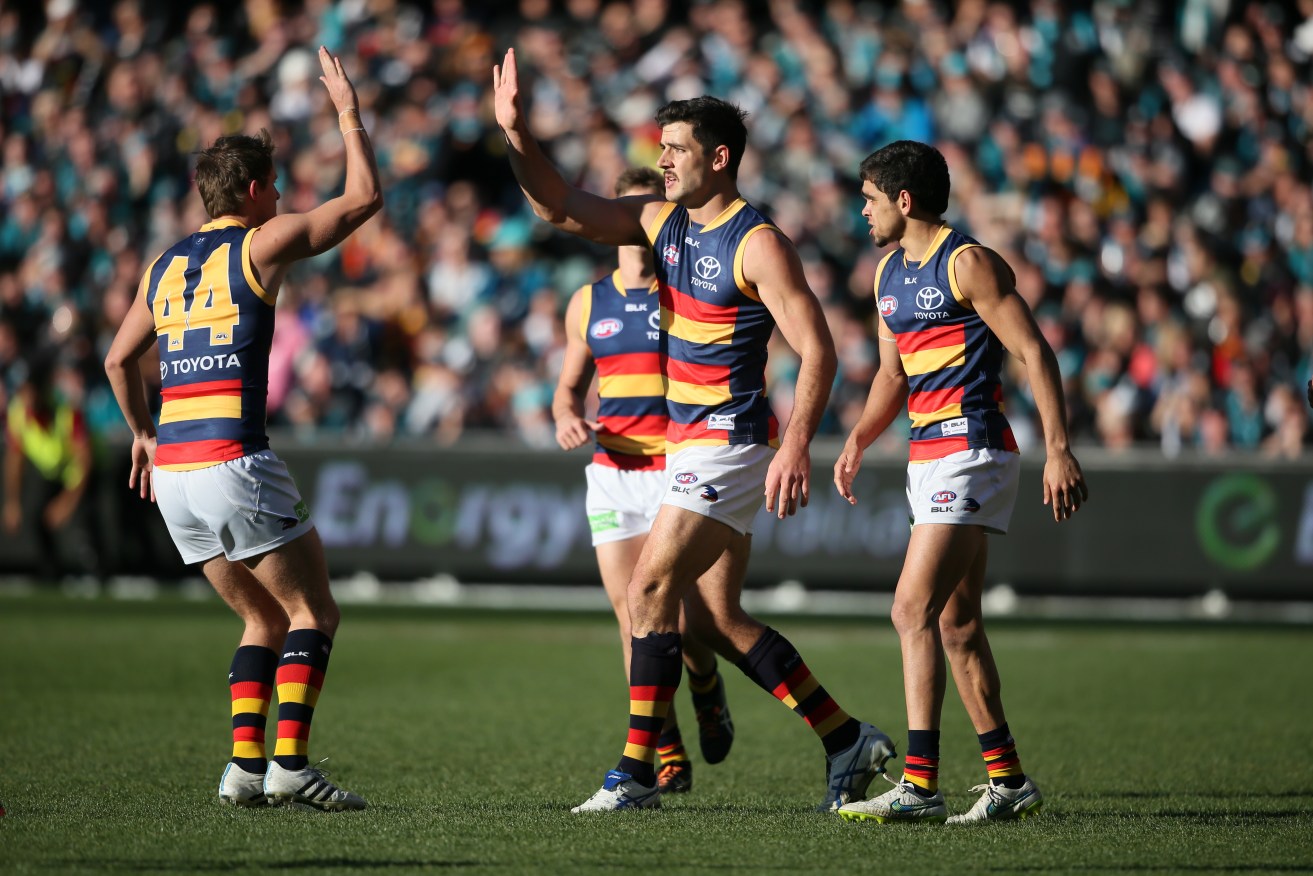‘Some clubs are more equal than others’: Crows go to war over $2m handicap
The Adelaide Football Club is set for a clash of wills with the AFL over league equalisation measures the Crows argue are smashing their bottom line, as they vow to “fight the good fight”.

Taylor Walker and Matt Crouch celebrate a goal during last year's emotional Round 16 Showdown. Photo: Ben Macmahon, AAP.
Club and league officials are meeting today to thrash out an issue that looms as the AFL’s equivalent of GST redistribution.
CEO Andrew Fagan told the club’s annual members’ meeting last night: “We’ve got to continue to make our core business work for us better.”
“Some of it’s through a structural model that doesn’t always work for us, most notably with the AFL, and AFL industry issues that we face,” he said.
“We’ll certainly fight the good fight.”
Chairman Rob Chapman told last night’s meeting that “the AFL is divided up between ‘haves’ and ‘have-nots’”.
“We’re one of the those clubs that hand out [and] a lot of people ask me how much we do hand out,” he said.
“Not to put too fine a point on it – it would be in the vicinity of $2 million.”
And that’s significant for a club that last night announced a modest – albeit record – operating profit of $1,493,636 for the 2015 financial year, with revenues of $44,492,629.
It was an expected turnaround from the previous year’s $408,011 operating loss, which despite record attendances was partly attributed to a confidential settlement with sacked coach Brenton Sanderson.
“Last year we had record sponsorship, record hospitality and record merchandise sales,” said Chapman.
“I like records – it means it hasn’t been done before.”
But he bemoaned the collective drain on the club’s finances of AFL equalisation measures, State Government contributions via a $700,000 levy paid by both SA clubs for the ‘Footy Express’ public transport service and the Crows’ commitment to the SANFL.
I’d rather not pay it and make Port pay it
The club writes off around $1.10 million a season to pay out its licence from the SANFL ($11.3 million over 15 years) and an annual $400,000 licence fee for its reserves side to play in the state league.
Port Adelaide is paying out almost $7 million over 15 years for its independence but, as a foundation SANFL club, does not pay the licence fee – a point that raised the ire of Adelaide members who questioned Chapman at last night’s forum.
“Port don’t pay that, and I don’t want to get into what we do and what they don’t,” the chairman said.
“We pay a fee – as do Port – to the SANFL for game development [but] the $400,000… we pay it, Port don’t.
“I’d rather not pay it and make them pay it,” he joked.
“[But] if we didn’t have to pay a transport levy – which 16 of the [AFL] clubs didn’t have to pay, or didn’t have to have an underwrite here for Adelaide Oval, or pay the SANFL a fee to play in their competition – we might see another $2 million on that bottom line.
“We have a $2 million [handicap] that a lot of other clubs don’t have, so I want you to know that could go to our bottom line.”
Chapman conceded that the handicap was “not going to change any time soon”.
“But we’re working on it,” he insisted.
“We’re meeting with the AFL… we’ve got a few points we’d like to raise with them.”
The AFL competition’s distribution policy – including its draft ethos – has long been predicated on the notion that “every team has a chance to win in any game, regardless of the club’s financial strength”.
In 2014, it augmented its equalisation measures, introducing “enhanced revenue sharing” and a “soft cap” on football expenditure outside player payments, with any spending above the cap subject to a luxury tax.
Clubs can, however, retain all self-generated revenue – which is significant for the Crows, who last night boasted record sponsorship, hospitality and merchandise sales.
In a statement to members, Fagan said the league’s equalisation structure “does not provide the flexibility to adjust to changing circumstances, nor reflect the financial construct and position of clubs like ours”.
“A record year across nearly all revenue streams should generate a greater surplus and facilitate further investment into our programs… I hope that this will be recognised by the AFL.”




